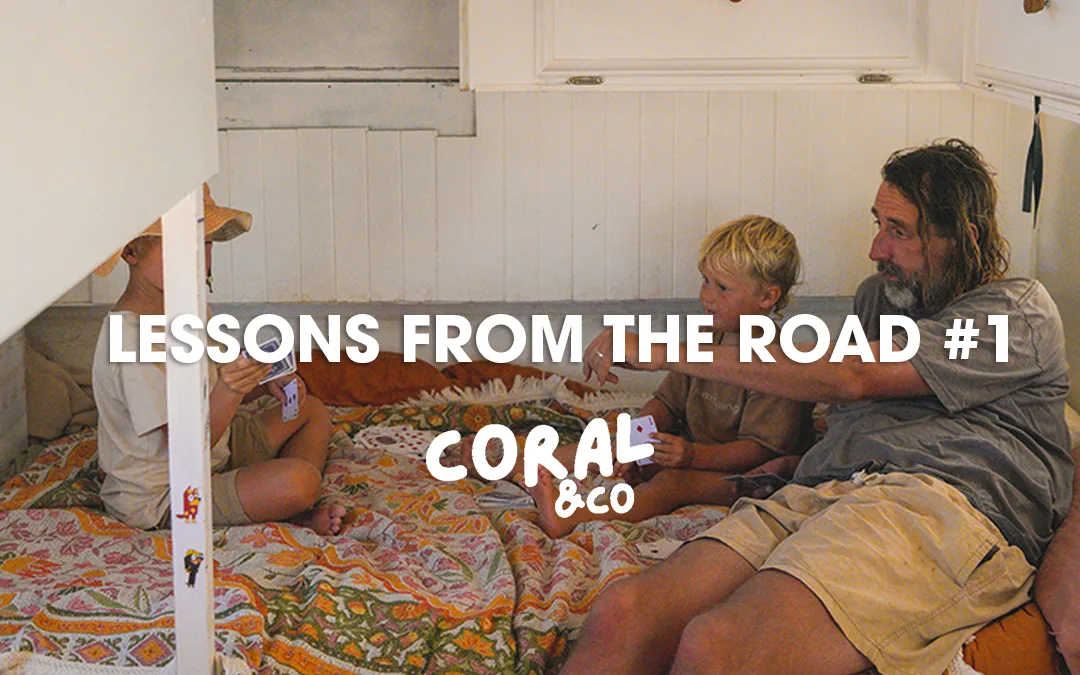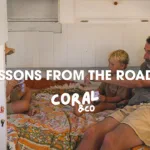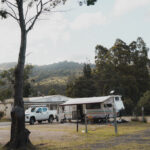We plan on creating a series of blogs detailing some of the key lessons we have learned while traveling as a family. We have been living on the road since the start of 2023. As of writing this, we have spent 24 months traveling and have experienced seven of the eight states of Australia.
As incredible as this journey has been, there have been plenty of moments that have tested us both individually and as a family. From the challenges of close-quarters living to the unexpected breakdowns and endless retelling of our story to curious strangers, life on the road is a learning experience like no other. Here are some of the lessons we’ve learned so far.
1. How to Deal with Increased Pressure
When we moved out of our townhouse and into a caravan, we drastically minimized our living space. We knew this was going to be a big adjustment, but actually experiencing it in those first few weeks was something else entirely. There is nowhere to hide in a caravan—emotionally or physically. There’s no couch to be sent to when you have a disagreement with your spouse. There’s no “go to your room for a time-out.” While the great outdoors is all around us, private moments shrink down to the confines of our car and caravan.
Adjusting to this new reality took time. It wasn’t overnight. It took about three months before we finally felt like we had found a rhythm. But once we did, we realized that the challenges of close living actually strengthened our family bond. It forced us to communicate better, manage emotions more effectively, and truly embrace the minimalist lifestyle that comes with life on the road.
2. Communication Becomes Even More Important
Before having children, Ella and I thought we were good communicators. Then we had kids and quickly realized we weren’t as good as we thought. Starting life in a caravan took that realization to a whole new level.
With everything physically shrinking, everything emotionally felt bigger. There was less space to express ourselves, and somehow, the kids seemed louder, and emotions felt more intense. Learning to communicate in this new reality became a critical lesson for us. And honestly, we still get it wrong some days. Despite spending so much time together, we sometimes only realize we’re not on the same page when something goes wrong.
One of the biggest takeaways from this journey has been learning to slow down. The same way we’ve learned to slow down and appreciate nature, we’ve had to apply that to how we communicate with each other. Taking a breath, stepping back, and allowing space for understanding has made all the difference. Every family has to find their own rhythm when it comes to managing time together, and for us, that has meant intentionally sitting down to talk—sometimes once a month, sometimes multiple times a week—depending on what we’re going through. The key is being open to the ebb and flow of life on the road.
3. When Multiple Things Go Wrong, They May Not Be Related
One of the biggest lessons we’ve learned about the caravan itself is that breakdowns and issues seem to happen in waves. It’s never just one thing—it’s always a few. The trick is having the emotional capacity to stay calm and assess each problem separately instead of feeling overwhelmed.
A funny story that highlights this happened early on in our travels. We were leaving a caravan park when we started experiencing braking issues. At the exact same time, a new ticking noise appeared. Concerned, we pulled over, unhitched the caravan, took the surfboards off the car, and called the NRMA. We waited an hour for assistance, but when the mechanic arrived, the ticking had disappeared.
Perplexed but relieved, we hooked everything back up and continued on our way. The braking issue resurfaced a few more times before we finally got it resolved, but the ticking noise returned almost immediately. A few kilometers down the road, I had a thought. I pulled over, took the surfboards off the car, and placed them inside the caravan. When we started driving again, the ticking was gone. It turned out the board bag had just been flapping in the wind, making it sound like there was a mechanical issue.
In that moment, I realized how easy it is to assume that multiple problems are connected, especially when tired and stressed. Learning to slow down and assess each issue individually has been invaluable.
4. Get Used to Repeating Your Story
If you enjoy having the same conversation once a week (or more), then caravan life is definitely for you. One of the realities of living on the road is that people are curious. Over the past two years, I’ve probably explained our lifestyle and travel story over 250 times. It’s something I have to remind myself of—every time I tell it, it’s the first time someone else is hearing it. Rather than getting annoyed, I’ve learned to embrace it.
In fact, I’ve actually refined my storytelling over time to make it more engaging. But what I’ve come to enjoy even more is flipping the script and asking more questions instead of always doing the talking. The beauty of caravan life is the incredible people you meet along the way—people who challenge your perspectives on life, family, work, and personal growth. By listening to their stories, we’ve been inspired in ways we never expected.
5. A Lesson from Cove: “Don’t Go Fast Down a Hill”
This one comes from my son, Cove. His advice? “Don’t go fast down a hill.” His reasoning? “So you don’t burn an engine.”
Funny enough, this ties into a not-so-funny (but now funny) experience we had on our first time driving down a “pass.” In Australian road terms, a “pass” refers to a steep section of road that takes you up or down a steep hill or mountain range. Our first encounter with this was the Bulli Pass. While Google Maps is a great tool, it doesn’t exactly have an option for “Show me the safest and easiest route possible.” Several times, it has led us down some sketchy roads that we probably wouldn’t have taken.
As we descended Bulli Pass, we were met with the unmistakable smell of burning brakes. By the time we reached our caravan park, the scent of rubber was overwhelming. Thankfully, we had a car service booked that week, and to our surprise, the mechanics gave our brakes a glowing report. That’s when I learned an important lesson—adjusting our electronic caravan brake sensitivity to match the conditions and speed we’re driving is crucial. This lesson came in handy about nine months later when we had a close encounter with a large moose.
So, if you’re caravanning, take it from Cove—don’t go fast down a hill, and learn how to adjust your brakes accordingly to prevent any immediate or long-term damage.
Life on the road is an adventure, but it comes with its own unique set of challenges. From managing personal space and communication to dealing with breakdowns and unexpected encounters, every experience has taught us something valuable. But through it all, we wouldn’t trade this journey for anything. The lessons we’ve learned lessons we have learned while traveling as a family have not only made us better travelers but also a stronger family.
We’re excited to share more insights in the next installment of Lessons from the Road. Until then, happy travels!




